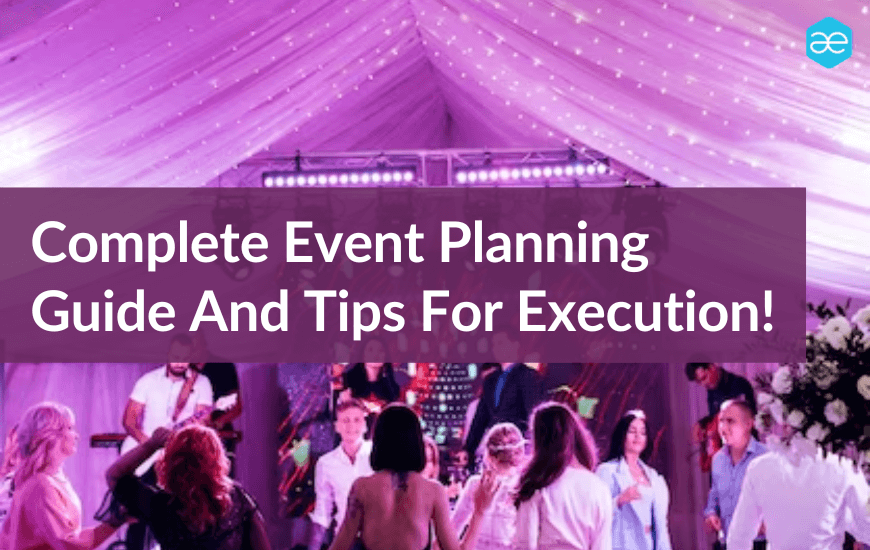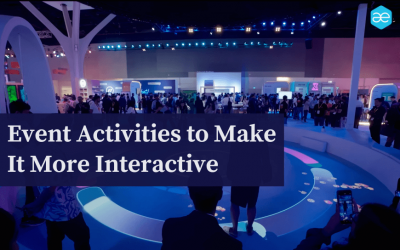Have you ever had a goal that felt like a distant wish? Organizing an event without planning is just a dream.
You might have the perfect event in mind, but how do you make it a reality? It’s simple- a goal broken down into steps becomes a plan, and a plan backed by action becomes reality.
In this guide, we’re here to help you bridge the gap between your vision and the actual event. We’ll take you through the ultimate event planning guide and show you how to execute it with finesse.
Let’s turn those dreams into real, remarkable events!
Simple steps to plan an event:
- Understanding the Event and Setting Clear Goals for it
- Creating a Realistic Budget for Your Event
- Choosing a Perfect Event Venue
- Create a Detailed Event Timeline and Follow that
- Market your Event for More Attendees
- Choosing Your Ticketing and Registration Platform
- Keeping an Eye on Event Analytics
- Collecting Attendees’ Feedback for Improvement
- Post-Event Evaluation and Analysis
Understanding the Event and Setting Clear Goals for it!

Every event has a unique purpose. Let’s break it down: you’re organizing a business conference, and your goal might be to share important information with attendees. If you’re planning a charity event to raise money for a local animal shelter, your goal is clear: raise funds to help animals. By setting clear goals, you know where you want to go.
So, whether it’s a small get-together or a large conference, knowing your goal and aligning every part of your event with that goal will help you create a purposeful and memorable event.
In event planning, having clear goals is like having a map. But not just any goals – SMART goals. SMART means they are Specific, Measurable, Achievable, Relevant, and Time-bound.
For instance, if you’re organizing a charity event to help animals, a SMART goal could be: “Raise $5,000 for the animal shelter within three months.” It’s like setting a clear target, so you know exactly where you’re heading.
This ensures your event planning is focused and effective, helping you turn your vision into a well-structured plan.
Creating a Realistic Budget for Your Event

Just like your fun day out, every event needs a budget. A budget is like a financial plan for your event. It tells you how much money you have and how you should spend it. Without a budget, it’s like going on that fun day out without knowing how much you can spend. You might run out of money or spend too much, and that’s not fun at all.
To create a realistic budget, you need to know how much money you have and how much you need for everything in your event – from decorations to food. Think of it like planning how much you’ll spend on each part of your fun day out. It helps you enjoy the day without worrying about running out of money. So, whether it’s a small gathering or a big event, having a budget ensures you can have a great time without financial stress.
Choosing a Perfect Event Venue
Let’s shift our focus to a corporate event – a vital business conference. The venue is central, like a big family reunion, but it’s all about professionalism.
For a corporate event, you must consider the convenience of your colleagues and clients, the technical capabilities for presentations, and the overall ambiance. It’s akin to choosing a conference facility with high-tech equipment and an environment that exudes professionalism.
Corporate events often happen in convention centers, top-tier hotels, or dedicated conference spaces. Each has distinct advantages. It’s like deciding whether to hold your business conference in a renowned convention center with expansive meeting rooms or an upscale hotel with state-of-the-art facilities.
It took us 30 seconds to come up with the event venue choices! Here is how
- Google to find venues in your desired location. For example, “New York corporate event venues.”
- Check reviews and details on venue websites— contact venues for information and availability.
- Negotiate terms, confirm your choice, and review the contract before securing your event date.
Here is the blog to help you out: Find Cost-Effective Event Venues Like a Pro
Create a Detailed Event Timeline and Follow that

Think of an event timeline as the schedule for your event, just like you have a timetable for school or work. It tells you what happens and when. To create a detailed event timeline, you need to plan every step of your event carefully.
Imagine you’re catching a flight. The airline follows a strict schedule, and you rely on it to reach your destination on time. Similarly, in event planning, sticking to the schedule is crucial. It ensures that everything happens smoothly and your guests have a great experience.
Tools are available for creating your event timeline, just like a chef has a recipe to follow when cooking. Event planning tools and software can help you keep track of all the important timings, from when the event starts to when key activities occur. These tools ensure everything runs on time, just like a well-oiled machine.
So, creating a detailed event timeline is like setting the stage for a great performance. It helps you manage time effectively and ensures your event flows seamlessly.
Market your Event for More Attendees
Marketing is like telling the world about your event, ensuring everyone knows it’s happening and why they should be a part of it. Think of marketing as your event’s megaphone; you must have an event promotion checklist. Social media event promotion and word of mouth are the best ways to spread the word. Social media event promotion, in particular, can be a powerhouse. It’s like a giant billboard for your event, with the added benefit of reaching people worldwide.
Consider event flyers, eye-catching posters, and engaging online ads for marketing materials. These materials are like your event’s calling cards. They give people a taste of what to expect and make them excited to attend.
With AllEvents, you can easily create and share these materials using the design asset tool. It’s like having your design studio to make your event look irresistible. So, marketing is the spark that lights up your event, and AllEvents is here to help you set the world on fire with your fantastic event.
Want help promoting your event? Connect to our event marketing experts today.

Choose your Ticketing and Registration Platform
From creating the event registration form to the check-in process, there is much to cover, and the ticketing platform is a must! Think of it as a fast lane for your guests. And selecting the ideal ticketing platform is like choosing the best tool for the job. When selling event tickets, collecting payments, and ensuring a smooth check-in process, your chosen platform can make or break the entire experience.
You can use AllEvents to create and sell event tickets, set prices, and track how many people join your event. It’s like a digital guest list that makes attendee management a breeze.
The cherry on top? You don’t have to wait for your payments; they go directly into your PayPal and Stripe accounts. It’s like having a full toolkit to ensure a flawless event ticketing process from start to finish.

Keeping an Eye on Event Analytics
Think of event analytics as your event’s treasure map. It’s a way to collect and use data to improve your event.
Data is like a secret code. It tells you what’s working and what’s not. Think of engaging with attendees like a conversation. You can post updates, answer questions, and even send reminders. During the event, it’s like keeping the party going. You can share live updates and interact with attendees. After the event, you can say ‘thank you’ and gather feedback.
With AllEvents analytics, you can see how many people are interested in your event, where they’re coming from, and more. It’s like having a crystal ball to predict what your attendees want.

Collecting Attendees’ Feedback for Improvement
Feedback is like a treasure chest of ideas to improve your event. Event organizers can use it as a roadmap for improvement.
Imagine you’ve hosted a party, and your friends tell you what they loved and what could be better. Event feedback is like that – it tells you what worked and what needs tweaking. You can learn what attendees enjoyed and what they’d like to see next time. It’s like having a magic wand to enhance your event.
Collecting feedback can be fun. You can use surveys, like online questionnaires, to gather opinions. It’s like asking your friends for their favorite party games. Social media polls are also fantastic, like voting on the best snacks. Additionally, direct communication, like chats or emails, can be super useful for detailed feedback.
AllEvents makes it easy to collect feedback too. You can create surveys and polls and engage with attendees through the platform. It’s like having a suggestion box at your event but online.
Post-Event Evaluation and Analysis

In the words of the great event planner Tony Robbins, “A real decision is measured by the fact that you’ve taken a new action. If there’s no action, you haven’t truly decided.”
Evaluating an event is like looking in the rear-view mirror to see how the journey went. It’s important to figure out what went well, what didn’t, and how you can improve for next time.
To start, gather feedback from attendees. It’s like asking passengers for their thoughts on the trip. What did they enjoy? What could have been better?
Next, review your event goals. Did you achieve what you set out to do? It’s like comparing your road map to the actual route you took.
Also, take a look at the budget. Did you stay on track financially? It’s like checking if you spent the right amount during the journey.
After considering this, you can create a report on your event’s performance. It’s like summing up the entire trip, from start to finish.
Also read: How can you make your event more interactive and fun?
Wrapping Up Event Planning Guide
As we wrap up our journey through event planning, it’s time to reflect on what we’ve learned.
We started by understanding that organizing an event is a dream without a plan. We broke down the importance of setting clear goals, much like defining the purpose of your event. We emphasized the value of budgeting, ensuring you have the resources you need for success. The right venue was likened to choosing the perfect setting for your event’s story.
Creating a detailed event timeline became our master script, guiding every act of your event. Marketing and promotion was our grand announcement to the world. We showcased the seamless event registration process with AllEvents assistance. Event analytics was the beacon of insights, and engaging with attendees before, during, and after the event built lasting connections.
We then collected feedback as a valuable gift to shape future events. Now, as we conclude, remember the golden rule of post-event evaluation: success is in the details, and those details come from thorough analysis.
So, dear readers, it’s time to take action and start planning your next incredible event with the help of AllEvents. Your journey is just beginning, and we’re here to make every event a masterpiece.
Related Read: Top Event Industry Statistics and Trends to Watch in 2025
Quick Answers
How to plan an event?
Successful event planning begins with setting clear, SMART goals. These goals should be Specific, Measurable, Achievable, Relevant, and Time-bound. They serve as your roadmap to creating a purposeful and memorable event.
Why is budgeting important for event planning?
Budgeting is crucial because it acts as a financial plan for your event. It helps you allocate resources efficiently, ensuring you have the necessary funds for each aspect of your event without any financial stress.
How can I effectively market my event for more attendees?
Effective marketing is like using a megaphone to announce your event to the world. Utilize social media, flyers, posters, and online ads to create a buzz. With AllEvents, you can easily create marketing materials to attract more attendees.
Why is a reliable ticketing and registration platform important?
A robust ticketing and registration platform streamlines the ticket-selling process, collects payments, and ensures a smooth check-in process. AllEvents provides a hassle-free solution, allowing you to create and sell tickets, manage registrations, and receive payments directly into your accounts.
What’s the significance of post-event evaluation and analysis?
Post-event evaluation and analysis help you identify what went well, what didn’t, and how to improve for future events. It’s a crucial step in continuous event enhancement.







